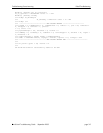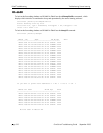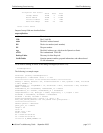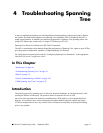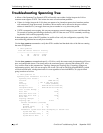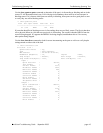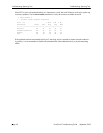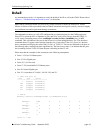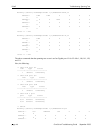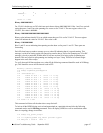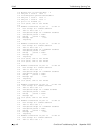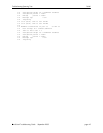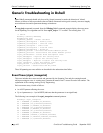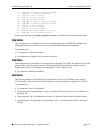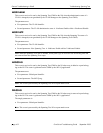
Troubleshooting Spanning Tree Dshell
OmniSwitch Troubleshooting Guide September 2005 page 4-5
Dshell
As mentioned previously, it is important to verify the health of the NI as well as the CMM. Please refer to
Chapter 1, “Troubleshooting the Switch System,” for directions.
Note. Dshell commands should only be used by Alcatel personnel or under the direction of Alcatel.
Misuse or failure to follow procedures that use Dshell commands in this guide correctly can cause lengthy
network down time and/or permanent damage to hardware.
The commands run above to verify STP configuration on a particular port give the CMM perspective.
Since STP is run on the NI it is important to query the NI to verify what was seen from the CMM. To
verify a ports forwarding status use the esmDumpCoronado slot,slice, 0x6608000+vlan_id*4,32
command. This will indicate if the port as the NI sees it is in forwarding/blocking. The 32 in the above
command shows 32 register values starting from the vlan_id specified. If the vlan_id used is 1 then the
above command will display the values from VLAN 1 to VLAN 31. The bits are dedicated to the ports in
the following order, starting from least significant bit. The bits are set (value=1) to indicate that the ports
are forwarding for that VLAN. If 0 then the port is blocking for that VLAN.
Please note that the examples in this section have the following assumptions:
• Ports 1-12: First 12 Ethernet ports.
• Port 13: First Gigabit port.
• Ports 14,15,16: Not used.
• Ports 17-28: Second half of 12 Ethernet ports.
• Port 29: Second Gigabit port.
• Port 1/1 is a member of VLANs 1,140,141,150, and 511.
-> show vlan port 1/1
vlan type status
--------+---------+--------------
1 default forwarding
140 qtagged forwarding
141 qtagged forwarding
150 qtagged forwarding
511 qtagged forwarding
-> dshell
Working: [Kernel]->esmDumpCoronado 1,0,0x6608000+1*4,32
6608004 : 1000 0 0 0 0 0
0 0
6608024 : 0 0 0 0 0 0
0 0
6608044 : 0 0 0 0 0 0
0 0
6608064 : 0 0 0 0 0 0
0 0
value = 1 = 0x1



